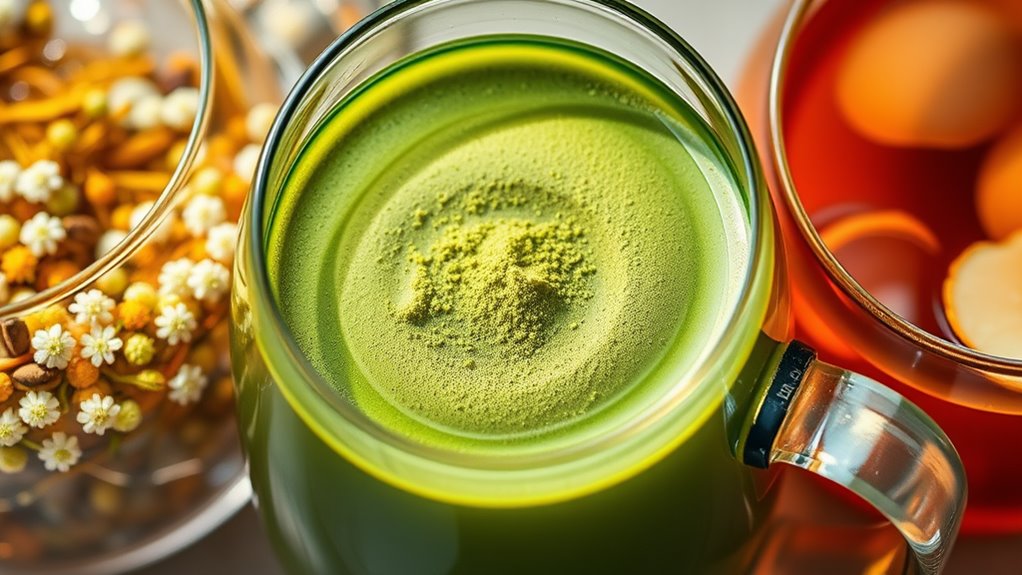The Herbal Combo That’s Amazing for Your Gut
If you’re looking for an amazing herbal combo to boost your gut health, consider mixing chamomile, ginger, peppermint, fennel, dandelion, licorice root, and turmeric. Chamomile soothes discomfort, while ginger aids digestion. Peppermint provides a refreshing effect and helps with nausea. Dandelion detoxifies and supports liver function, and licorice root eases bloating. Turmeric brings anti-inflammatory properties to the mix. Together, these herbs can enhance your overall well-being. Discover the best ways to brew and enjoy these powerful teas.
Key Takeaways
- A combination of chamomile and ginger tea soothes digestive discomfort while reducing bloating and enhancing nutrient absorption.
- Peppermint tea relaxes gastrointestinal muscles and offers antimicrobial properties, making it effective for gut health, especially in IBS.
- Fennel tea relieves gas and bloating, while its antioxidants protect the gut from oxidative stress and inflammation.
- Dandelion tea promotes liver function and digestion, supporting a healthy gut microbiome and alleviating bloating.
- Turmeric, combined with black pepper, reduces intestinal inflammation and enhances beneficial gut bacteria for improved digestive health.
Understanding Gut Health
Gut health is often referred to as the cornerstone of overall well-being, and for good reason. Your gut houses trillions of microorganisms that influence digestion, immunity, and even mood. When this balance is disrupted, it can lead to various health issues.
Incorporating gut healing herbal teas into your routine can be an effective way to support this delicate ecosystem. Ingredients like ginger and chamomile are known for their anti-inflammatory properties, while peppermint can help soothe discomfort. Additionally, herbal teas promote digestion by harnessing the natural benefits of their ingredients.
These teas not only provide hydration but also deliver essential nutrients that promote healthy gut flora. By prioritizing your gut health through these natural remedies, you’re taking a proactive step towards enhancing your overall health and vitality.
The Role of Herbal Teas in Digestion
Maintaining a healthy digestive system is key to overall wellness, and herbal teas can play a significant role in this process. These teas often contain compounds that promote digestion, reduce bloating, and soothe discomfort. For instance, peppermint tea can help relax digestive muscles, while ginger tea is known for its anti-inflammatory properties. Incorporating herbal teas into your routine can also provide benefits for gut health and radiant skin.
Here’s a quick overview of common herbal teas and their digestive benefits:
| Herbal Tea | Key Benefit | Best Time to Drink |
|---|---|---|
| Peppermint | Relaxes digestive muscles | After meals |
| Ginger | Reduces inflammation | Before or after meals |
| Fennel | Alleviates gas and bloating | Anytime |
| Dandelion | Stimulates appetite | Before meals |
Incorporating these teas into your routine could enhance your digestive health significantly.
Chamomile: The Soothing Flower
Chamomile isn’t just a lovely flower; it’s packed with benefits for your gut health. With its anti-inflammatory properties, this herbal remedy can help soothe digestive discomfort while also calming your stomach. Additionally, chamomile tea is known for enhancing digestive health, making it a great addition to your wellness routine.
Anti-Inflammatory Properties
When you’re seeking relief from inflammation, you might want to consider the soothing qualities of chamomile. This gentle flower is packed with antioxidants and anti-inflammatory compounds that can help reduce swelling and discomfort. Studies suggest that chamomile may inhibit the production of inflammatory markers in the body, promoting overall wellness.
Here’s a quick comparison of chamomile’s anti-inflammatory benefits:
| Benefit | Evidence |
|---|---|
| Reduces Swelling | Contains chamazulene and bisabolol |
| Eases Pain | Acts as a natural analgesic |
| Supports Immune Response | Antioxidant properties |
| Enhances Sleep Quality | Reduces stress-related inflammation |
Incorporating chamomile into your routine may offer a simple, effective way to manage inflammation and promote a healthier gut.
Digestive Aid Benefits
If you’re looking for a natural way to support your digestive health, chamomile might just be the answer. This gentle flower has been used for centuries to aid digestion and alleviate discomfort.
Research shows that chamomile can help reduce bloating and gas, making it a popular choice for those with sensitive stomachs. Its anti-inflammatory properties may soothe the gastrointestinal tract, promoting smoother digestion.
Additionally, chamomile can enhance your body’s ability to absorb nutrients, ensuring you get the most from your meals. Whether enjoyed as a tea or in supplement form, incorporating chamomile into your routine can provide a calming influence, easing digestive issues naturally.
Give it a try—you might find it’s just what your gut needs.
Calming Effects on Stomach
While many herbs boast digestive benefits, few can match chamomile’s calming effects on the stomach. This gentle flower has been used for centuries to soothe digestive discomfort, thanks to its anti-inflammatory and antispasmodic properties.
When you sip chamomile tea, you’re not just enjoying a warm beverage; you’re also easing tension in your stomach muscles and promoting relaxation. Studies show that chamomile can help reduce symptoms of indigestion and bloating, making it a go-to remedy for those uneasy moments.
Plus, its mild sedative effects can help you unwind, further aiding digestion. So, whether you’re dealing with an upset tummy or just need to relax, chamomile might be the soothing solution you’ve been searching for.
Ginger: A Natural Digestive Aid
Ginger, known for its warm, spicy flavor, has long been celebrated not just in culinary traditions but also as a powerful natural remedy for digestive issues.
If you’re looking to boost your gut health, consider incorporating ginger into your diet. Here are four ways it can help:
-
Reduces Nausea: Ginger is effective in alleviating nausea, whether from motion sickness or morning sickness.
-
Aids Digestion: It stimulates saliva production and bile flow, promoting better digestion.
-
Relieves Gas: Ginger can help expel gas and reduce bloating, making you feel more comfortable.
-
Anti-Inflammatory Properties: Its anti-inflammatory compounds can soothe the digestive tract, reducing discomfort. Additionally, ginger is often featured in herbal teas known for PMS relief, which can further enhance its benefits for overall wellness.
With these benefits, adding ginger to your meals or sipping ginger tea can be a great step for your gut health!
Peppermint: Freshness for Your Gut
Peppermint isn’t just a refreshing flavor; it’s also a powerhouse for gut health.
Its soothing properties can help relieve digestive discomfort and bloating, making it a go-to remedy for many.
Peppermint’s Soothing Properties
When you’re seeking relief from digestive discomfort, peppermint often emerges as a powerful ally. Its soothing properties can help calm your gut and promote overall digestive health.
Here are four ways peppermint can benefit you:
-
Muscle Relaxation: Peppermint oil can relax the smooth muscles of the gastrointestinal tract, easing cramps and bloating.
-
Cooling Effect: The menthol in peppermint offers a refreshing sensation, providing immediate comfort during digestive distress.
-
Antimicrobial Action: Peppermint possesses natural antimicrobial properties, which may help fend off harmful bacteria in your gut.
-
Aromatherapy Benefits: Inhaling peppermint oil can also reduce nausea and enhance your mood, making it easier to cope with digestive issues.
Incorporating peppermint into your routine could be a simple yet effective way to support your gut health.
Digestive Benefits Explained
While many natural remedies claim to support digestive health, peppermint stands out due to its unique properties that specifically target gastrointestinal discomfort.
Research shows that peppermint oil can relax the muscles of your gastrointestinal tract, helping to alleviate symptoms like bloating and gas. It’s often used in treating irritable bowel syndrome (IBS), where it can reduce abdominal pain and improve overall gut function.
Additionally, the menthol in peppermint has been found to enhance bile flow, which aids in fat digestion. Incorporating peppermint tea or oil into your routine can provide a refreshing way to support your gut health.
Fennel: A Flavorful Remedy
Fennel, a vibrant herb with a sweet, anise-like flavor, has been celebrated for centuries not just for its culinary uses but also for its remarkable health benefits, particularly for gut health.
Incorporating fennel into your diet can provide several advantages:
-
Digestive Aid: Fennel seeds can help relieve bloating and gas.
-
Antioxidant Properties: They contain compounds that protect your gut from oxidative stress.
-
Anti-inflammatory Effects: Fennel may reduce inflammation in the digestive tract, promoting better gut health.
-
Nutrient-Rich: It’s a good source of vitamins C and A, which are essential for maintaining digestive health.
Adding fennel to your meals not only enhances flavor but also supports your gut, making it a flavorful remedy worth trying!
Dandelion: The Detoxifying Herb
After exploring the benefits of fennel, it’s time to look at another powerful herb that can enhance gut health: dandelion.
This often-overlooked plant isn’t just a garden nuisance; it’s packed with nutrients and potential health benefits. Dandelion is known for its detoxifying properties, promoting liver function and aiding in the elimination of toxins from your body.
The leaves are rich in vitamins A, C, and K, while the roots can stimulate digestion and support a healthy gut microbiome. You might find dandelion tea particularly beneficial, as it can help alleviate bloating and improve overall digestion.
Incorporating dandelion into your diet may just be the boost your gut needs, making it a worthy addition to your herbal arsenal.
Licorice Root: A Sweet Solution
Licorice root isn’t just a tasty treat; it also offers impressive gut health benefits.
Its anti-inflammatory properties can soothe digestive issues, making it a great addition to your wellness routine.
Plus, as a natural sweetener alternative, it might just satisfy your cravings while supporting your gut.
Gut Health Benefits
When it comes to supporting gut health, licorice root stands out as a sweet solution with impressive benefits. This herbal remedy can help you maintain a balanced digestive system and promote overall well-being.
Here are some key gut health benefits of licorice root:
-
Soothes Digestive Discomfort: It can alleviate symptoms like bloating and heartburn.
-
Supports Mucosal Health: Licorice root aids in maintaining the mucous membrane lining of the gastrointestinal tract.
-
Promotes Healthy Gut Flora: It encourages the growth of beneficial gut bacteria, enhancing your microbiome.
-
Boosts Digestive Enzymes: This root may stimulate digestive enzyme production, improving nutrient absorption.
Incorporating licorice root into your routine can be a delicious way to enhance your gut health!
Anti-inflammatory Properties
Although many people associate licorice root with its sweet flavor, its anti-inflammatory properties are equally noteworthy. This herb contains glycyrrhizin, a compound known to reduce inflammation and soothe gastrointestinal tract irritation. By incorporating licorice root into your routine, you may experience relief from conditions like IBS or gastritis.
Here’s a quick overview of its benefits:
| Property | Benefit | Evidence Source |
|---|---|---|
| Anti-inflammatory | Reduces gut inflammation | Journal of Ethnopharmacology |
| Soothing effect | Eases digestive discomfort | Phytotherapy Research |
| Immune support | Balances immune response | Immunopharmacology |
Incorporating licorice root can be a sweet yet effective addition to your gut health regimen.
Natural Sweetener Alternative
Have you ever considered using a natural sweetener that not only satisfies your sweet tooth but also supports gut health? Licorice root is an excellent option, offering a unique sweetness along with several gut-friendly benefits.
Here are four reasons to consider licorice root as your go-to sweetener:
-
Gut Soothing: It contains glycyrrhizin, which can help soothe gastrointestinal issues.
-
Anti-inflammatory: Licorice root has anti-inflammatory properties that can support overall gut health.
-
Digestive Aid: It promotes healthy digestion by stimulating the production of digestive enzymes.
-
Natural Sweetness: Its sweetness is often more potent than sugar, allowing you to use less.
Incorporating licorice root into your diet could be a delicious way to enhance both flavor and health!
Turmeric: The Anti-Inflammatory Powerhouse
Turmeric, often hailed as an anti-inflammatory powerhouse, can significantly benefit your gut health due to its active compound, curcumin.
Research shows that curcumin helps reduce inflammation in the intestines, which can alleviate symptoms of digestive disorders like irritable bowel syndrome (IBS) and inflammatory bowel disease (IBD).
By incorporating turmeric into your diet, you may enhance your gut’s microbiome, promoting beneficial bacteria while inhibiting harmful ones. This balance is crucial for overall digestive health.
Plus, turmeric’s antioxidant properties can protect your gut cells from damage, further supporting healing.
Adding turmeric to your meals or smoothies is an easy way to harness its benefits. Just be sure to combine it with black pepper to increase curcumin’s absorption for maximum effect.
How to Brew the Perfect Herbal Tea Blend
Incorporating herbal teas into your routine can be a delightful way to support your gut health, especially when combined with powerful herbs like turmeric.
Brewing the perfect herbal tea blend is simple, and here’s how you can do it:
-
Choose Your Base: Start with a quality herbal base like chamomile or peppermint for flavor and digestive support.
-
Add Turmeric: This anti-inflammatory powerhouse can enhance gut health and adds a warm, earthy taste.
-
Incorporate Other Herbs: Consider ginger for digestion, or fennel for bloating relief.
-
Steep Properly: Use boiling water and steep for 5-10 minutes to extract the full benefits of the herbs.
Enjoy your tea warm, and sip mindfully to maximize its gut-supporting potential!




